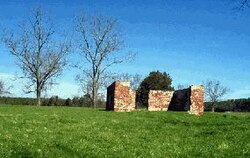Green Spring Plantation
|
Green Spring
|
|

Remains of ancillary jail structure at Green Spring Plantation site
|
|
| Nearest city | Williamsburg, Virginia |
|---|---|
| Coordinates | 37°15′27″N 76°48′11″W / 37.25750°N 76.80306°WCoordinates: 37°15′27″N 76°48′11″W / 37.25750°N 76.80306°W |
| Area | 190 acres (77 ha) |
| Built | 1645 |
| Part of | Colonial National Historical Park (#66000839) |
| NRHP Reference # | 78000261 |
| VLR # | 047-0006 |
| Significant dates | |
| Added to NRHP | December 29, 1978 |
| Designated VLR | March 19, 1997 |
Green Spring Plantation in James City County about five miles (8 km) west of Williamsburg, was the 17th century plantation of one of the more popular governors of Colonial Virginia in North America, Sir William Berkeley, and his wife, Frances Culpeper Berkeley.
Sir William Berkeley, who served several terms, is perhaps the best-known of Virginia's colonial governors. Contrary to popular belief the well-known Berkeley Plantation in nearby Charles City County was not named in his honor.
Today, a section of the land that formed the core of Green Spring Plantation is part of the Colonial National Historical Park.
The name Green Spring Plantation originated from the natural spring on the site, which continues over 350 years later to produce huge quantities of very beautifully clear, ultra cold water. The Green Spring produced a flow "so very cold that 'twas dangerous drinking the water thereof in Summer-time," wrote a visitor in the 1680s."
The plantation house at Green Spring was built in 1645. The plantation originally encompassed a 2,090-acre (850 ha) experimental farm.
Seeking alternative export products to supplement tobacco, which had become the Colony's mainstay, Green Spring produced flax, fruits, potash, rice, silk, and spirits, which were shipped to markets in North America, the West Indies, Great Britain, and Holland.
...
Wikipedia


